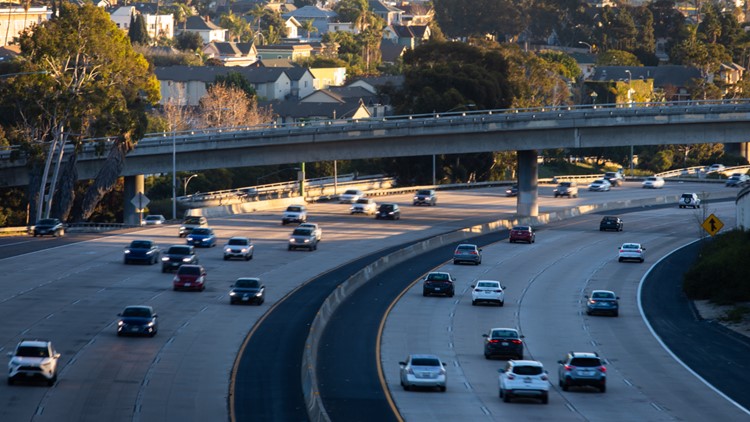SAN DIEGO COUNTY, Calif. — In response to an inewsource investigation, three of the five police departments in San Diego County that were illegally sharing drivers’ location data out of state have since changed their practice to comply with the law.
Police in Carlsbad, Coronado and Oceanside are now only sharing data collected from automated license plate readers with other agencies in the state of California — as required by Senate Bill 34.
But police in Escondido and La Mesa are refusing to change, defending their policies and claiming they’re doing nothing wrong.
“It’s an absolute breakdown of trust,” said Yusef Miller, a social justice activist with the North County Equity & Justice Coalition and the Racial Justice Coalition of San Diego.


“The community needs to know these people have information about you that is not police related.”
In early January, the inewsource investigation revealed at least 300 cameras scattered throughout the county collect a host of information from every license plate that comes into view, including the time, date, location and sometimes a partial image of the vehicle. The information is automatically stored in a searchable database for up to one year and shared with select agencies.
License plate readers are a powerful tool that can assist law enforcement with identifying people who commit crime.
But when pieced together, the information collected can offer the government an unrestricted view into the daily routines of drivers in San Diego County — from where they go to who they spend their time with.
That’s why state lawmakers in 2015 strengthened privacy protections for drivers and established strict rules for how police can use the technology, which includes keeping this private information inside the state of California.
The inewsource investigation revealed that half of the county’s 10 local law enforcement agencies had been illegally sharing that information with other agencies across the United States.
It all comes down to an agreement these agencies have with a private company named Vigilant Solutions — the contractor most police agencies across the state use to collect and share the license plate data. As part of their agreement with Vigilant, agencies select who else can have access to the information collected by their cameras. They can choose to share data with every public safety agency that participates in the network, or on an agency-by-agency basis.
Whatever the decision, the company then generates a “data sharing report,” which includes an alphabetical list of every agency that has access to all of the data collected.
inewsource obtained sharing reports from each participating agency and found hundreds of small police departments in states as far away as Florida, New York and Connecticut have been given access to information about drivers in San Diego County.
The problem is those out-of-state agencies do not have to follow the same set of rules for how and when private information collected from this technology can be accessed, said Vasudha Talla, director of the Immigrants’ Rights Program at the ACLU of Northern California.
Talla is representing activists who are suing the Marin County sheriff for sharing this data with out-of-state and federal agencies. A sheriff’s spokesperson said the office plans to defend its policy in court.
Simply removing those agencies from the share report can fix the problem.
After weeks of back and forth, inewsource laid out the details of its investigation with the five police agencies in November, including the assertion that their practice of sharing license plate information with out-of-state agencies was a violation of state law.
Coronado police responded quickly, saying they had decided to end the practice. Carlsbad police a few weeks later said they've fixed an error that allowed the Las Vegas Metro Police Department to access their data.
A lieutenant with Oceanside police also responded swiftly, saying the department had stopped sharing its data with “many agencies” without providing proof, and then stopped responding to emails.
After publication this month, Oceanside City Manager Deanna Lorson said she was not aware the department was sharing this information out of state, but police had decided to stop the practice effective Dec. 1 — the day after an inewsource reporter laid out the details of the investigation and asked the lieutenant to respond.
Oceanside police provided inewsource with a new report last week that reflects the change.
“Our rationale for this change is that agencies within our state are bound by the same laws and rules as we are, therefore the risk of data being used inappropriately is significantly reduced,” said Jennifer Atenza, a spokesperson for Oceanside police.
“Although we have no record that any of our data has been used in violation of our laws and rules, we no longer have to depend on agencies from other states, who likely operate under different rules and laws, to ensure compliance meets our standards.”
Elected leaders, police and other city officials in Escondido and La Mesa either refused to respond, referred inewsource to other departments or pushed back against the investigation’s findings.
Escondido City Attorney Michael McGuinness challenged the accuracy of the investigation and disputed the fact that the department is breaking the law, saying in an email, “your interpretation of (the law) makes no sense.”
He argued that a “public agency” as defined within the law would include police agencies in other states. He cited case law that says when in doubt, courts try to determine the law’s intent.
But former state Sen. Jerry Hill, a Democrat from San Mateo who sponsored the law, told inewsource that the intent was to prevent private information collected by this technology from ever leaving the state.
McGuinness went on to defend the practice by highlighting an example of an Escondido sex offender failing to register their move to Arizona. Using this technology, the sex offender was found in Idaho and reported to law enforcement, he said.
“Sharing (license plate) data solves crimes and keeps our community and others safer,” he added.
Escondido Mayor Paul McNamara did not respond to a request for comment, and neither did La Mesa Mayor Mark Arapostathis.
In La Mesa, City Manager Greg Humora declined to comment and instead deferred to the police department. A spokesperson sent the same statement that was prepared by police and the city attorney before the inewsource investigation was published, which said the agency wasn’t doing anything wrong.


Janet Castaños is a retired educator who serves as chair of the La Mesa Community Police Oversight Board, which is tasked with reviewing police conduct and improving the community’s relationship with law enforcement.
Castaños said she doesn’t believe La Mesa is breaking the law and there are sometimes good reasons to share the license plate data with out-of-state agencies.
“If a child is abducted and the kidnapper crosses state lines, we want that child identified and the car found as quickly as possible,” Castaños said.
She said the department has taken steps to ensure the information isn’t shared with federal immigration officials to protect the rights and safety of undocumented people in the community. But she doesn’t have a problem with La Mesa police sharing license plate data with neighboring states when lives are threatened.
Even so, the information collected by La Mesa police is shared automatically with nearly 300 agencies across the country, and the vast majority of it most often has nothing to do with solving crime or protecting the public.
The state auditor published a report in 2020 that said the risk of misusing the technology increases as information is widely distributed. There are hundreds of examples of police across the country misusing license plate data.


“We cannot have the mentality that the ends justify the means,” said Geneviéve Jones-Wright, a prominent criminal justice reform advocate and executive director of Community Advocates for Just and Moral Governance.
“It seems as soon as you start to ask questions or, God forbid, ask for accountability, you are now anti-police, you’re anti-law enforcement, you don’t care about public safety, and we really have to move away from that. That is a detriment to our community.”
As communities begin to rethink public safety and what it means, Jones-Wright said it’s vital to include the idea that people should be safe from law enforcement agencies and mass surveillance technology that infringe upon rights to privacy.
inewsource is a nonprofit, independently funded newsroom that produces impactful investigative and accountability journalism in San Diego County. Learn more at inewsource.org. Learn more at inewsource.org.
Watch more inewsource content below:



